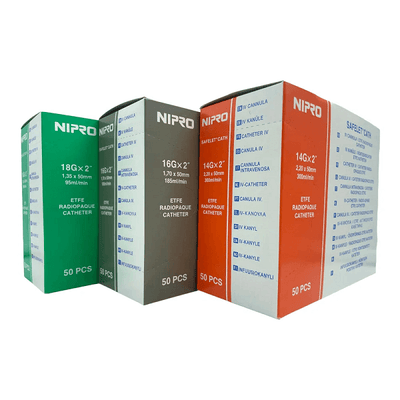Starting in the body piercing industry can be exciting but also a bit overwhelming. There's a lot to think about, especially when it comes to finding the right supplies. For beginners, figuring out what tools and equipment you need, where to get them, and how to ensure they are safe and of good quality can be confusing.
So, we are here to help. We will break down everything you need to know about essential body piercing supplies in a way that's easy to understand, helping you get set up with confidence.
Is body piercing good for health?
Body piercing is generally safe when performed by a professional using proper techniques and sterile equipment. However, it does carry some health risks, such as infections, allergic reactions, and the potential for scarring.
Choosing a reputable piercer, ensuring that only sterile equipment is used, and following proper aftercare instructions can significantly minimise these risks. It's also important for individuals to consider their health conditions, such as allergies to certain metals, and to discuss any concerns with their piercer before getting a piercing.
Common types of piercings
Piercings are a popular form of body modification, and there are many different types depending on the part of the body being pierced. Here's a look at some of the most common types:
Ear piercings
- Lobe Piercing: The most common type involves the soft lower part of the ear.
- Helix Piercing: Placed along the upper edge of the ear's cartilage.
- Industrial Piercing: Features two holes in the cartilage connected by a single piece of jewellery.
- Tragus Piercing: Located on the small cartilage flap right in front of the ear canal.
- Daith Piercing: Innermost cartilage fold of the ear, sometimes believed to aid in alleviating migraines.
Facial piercings
- Nose Piercings: These can be on the nostril, septum, or bridge.
- Eyebrow Piercing: Typically vertical, near the outer corners of the brow.
- Lip Piercings: Includes various placements around the mouth such as labret (below the lip), Monroe (above the upper lip, to one side), and snake bites (two symmetrical piercings below the lower lip).
Oral piercings
- Tongue Piercing: Usually in the centre of the tongue.
- Frenulum Piercing: This can be done on various web-like folds of skin, including under the tongue and upper lip.
Body piercings
- Navel Piercing: Often placed in or around the belly button.
- Nipple Piercing: This can be done on either or both nipples, usually horizontally.
- Surface Piercings: These can be placed on various flat surfaces of the body and have a higher risk of rejection.
Genital piercings
- Vary significantly between sexes, each with its own types and specific placements.
List of body piercing supplies
1. Piercing needles
Piercing needles are essential tools in body piercing. They come in various types, including straight, curved, and cannula needles, each designed for specific types of piercings.
Moreover, the gauge (thickness) and length of the needle are chosen based on the location and nature of the piercing to ensure safety and accuracy. It is crucial to select the appropriate needle type to minimise tissue damage and support the healing process.
Examples of piercing needles:
- Straight needles for earlobe piercings
- Curved needles for eyebrow piercings
- Cannula needles for navel piercings
If you're looking to buy high-quality piercing needles, check out our shop for a wide selection of all types you need!
2. Piercing jewellery
The jewellery used in piercings is made from a variety of materials such as surgical steel, titanium, and bioplast, each offering different benefits. Common types of jewellery include barbells, rings, and studs, which are chosen based on the specific piercing. Initial jewellery should be carefully selected to avoid allergic reactions and accommodate swelling, with a preference for hypoallergenic materials.
Examples of piercing jewellery:
- Surgical steel barbells for tongue piercings
- Titanium rings for septum piercings
- Bioplast studs for sensitive piercings
For those looking to expand their collection or find the perfect piece for a new piercing, visit our shop to explore our extensive range of high-quality piercing jewellery.
3. Piercing tools
Tools like forceps and clamps are used to stabilise the area and ensure precise needle placement during the piercing process. Dermal punches are specialised tools used for particular types of piercings. Additionally, measuring tools are crucial for selecting the correct jewellery size to fit the piercing site properly.
Examples of piercing tools:
- Forceps for holding the skin during a navel piercing
- Dermal punches for cheek piercings
- Calipers for measuring jewellery size
For professionals looking to enhance their piercing toolkit or newcomers starting their practice, be sure to visit our shop for a comprehensive selection of piercing tools like forceps designed for precision and safety.
4. Sanitation and sterilisation equipment
Sterilisation is paramount in piercing to prevent infections. Autoclaves sterilise jewellery and tools effectively, while disinfectants and sanitisers are used to clean surfaces and skin. It is also essential to use single-use gloves and aprons to prevent cross-contamination between clients and piercings.
Examples of sanitation and sterilisation equipment:
- Autoclaves for sterilising jewellery
- Alcohol-based disinfectants for cleaning skin
- Single-use gloves for each piercing session
5. Aftercare products
Proper aftercare is crucial to the healing of piercings. Saline solutions and medicated sprays are commonly used to clean new piercings while healing ointments help soothe the area and accelerate healing. Following specific aftercare instructions is vital to prevent infections and ensure a smooth healing process.
Examples of aftercare products:
- Medicated ointments for reducing inflammation
- Saline solution sprays for cleaning piercings
For a top-rated saline solution, consider the EASYPIERCING® 50ml Saline Solution, available in our shop. This saline solution is renowned for its efficacy in cleaning piercings gently and effectively, making it a must-have for your aftercare routine.
Legal and health considerations
For body piercers operating in the UK, understanding and adhering to specific legal regulations and health standards is essential for ensuring both the safety of clients and the compliance of your practice.
Regulations on piercing supplies
In the UK, piercing supplies and equipment must meet strict safety and health regulations. These are enforced to ensure that all tools and jewellery are safe, sterile, and suitable for use.
Suppliers and piercers must ensure their products comply with UK standards, such as those outlined by the European Union or UK-specific regulations regarding metals and materials used in body jewellery.
It's crucial to source supplies from reputable vendors who adhere to these standards to avoid legal issues and ensure client safety.
Certifications necessary for safe piercing practices
- Infection Control Certification: Training that covers sterilisation techniques, handling of bloodborne pathogens, and general hygiene practices.
- First Aid and CPR Certification: Essential for managing any immediate health issues that may arise during a piercing session.
- Certification in Bloodborne Pathogens: Specialised training focusing on the prevention of diseases such as HIV, Hepatitis B, and Hepatitis C.
- Local Authority Licensing: A license obtained from the local council, confirming that the piercing studio meets health and safety standards.
- Environmental Health Officer Approval: Certification indicating regular inspection and compliance with local health regulations.
Choosing suppliers and purchasing tips
Establish your needs
Before you start purchasing, it's crucial to clearly define what supplies you'll need. This includes needles, jewellery, sterilisation equipment, aftercare products, and tools like forceps and clamps. Consider the types of piercings you plan to offer to determine the specific varieties and quantities of each item. Also, estimate your client volume to ensure you purchase enough supplies to meet demand without excessive overstocking.
Choosing reputable suppliers
Selecting the right suppliers is fundamental to the success of your piercing business. Look for suppliers who adhere to industry standards such as ISO for manufacturing practices and ASTM for material safety, ensuring that the products are safe and of high quality.
It's also important to check for positive reviews from other professionals in the industry; this can be done through forums, social media, or industry-specific networking events. Initially, consider ordering smaller quantities or requesting samples to test the quality of the products.
Focus on quality over quantity.
Investing in high-quality supplies is crucial for ensuring the safety and satisfaction of your clients. High-quality tools and jewellery not only minimise the risk of complications such as infections and allergic reactions but also provide better durability and performance.
While these items may come at a higher upfront cost, they tend to offer greater long-term savings by reducing the need for frequent replacements and minimising potential liability issues.
Establish good relationships
Building a good relationship with your suppliers can lead to numerous benefits, including better pricing, reliable supply, and favourable terms such as return policies and efficient delivery options.
Effective communication is key; ensure that your suppliers are responsive and supportive, as this will be crucial in situations where you need advice or assistance.
Managing inventory effectively
Proper inventory management is essential to run your business efficiently. Regular inventory audits can help you keep track of what you have, what needs to be reordered, and the shelf life of perishable items.
Implementing a just-in-time inventory system can help reduce costs by keeping stock levels aligned closely with your actual demand. This approach helps prevent overstocking and ensures that your supplies are fresh and up to date.
Continuous evaluation
Continually assess the performance of your suppliers in terms of product quality, delivery reliability, and customer service. It’s also beneficial to use client feedback to gauge whether the supplies meet their expectations. If issues arise, don’t hesitate to re-evaluate and switch suppliers if necessary to maintain the high standards of your service.
Final thoughts
Starting your body piercing practice with the right supplies is essential for safety and success. This guide has covered everything you need, from choosing sterile needles to picking high-quality jewellery.
Remember, good hygiene and proper care are as important as having the right tools. With this information, beginners can feel confident about setting up their piercing business and providing great service to their clients.


























































 Studio supplies
Studio supplies












 Power & batteries
Power & batteries







 Aftercare
Aftercare




















 Apprentice
Apprentice


 Piercing & jewellery
Piercing & jewellery







 PMU supplies
PMU supplies




 New arrivals
New arrivals
 Gift vouchers
Gift vouchers
 Shop all
Shop all












































